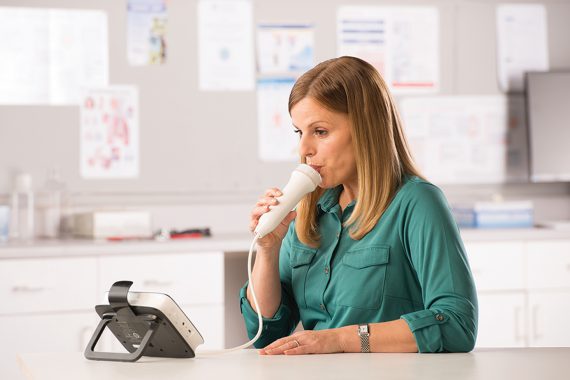Exclusive Just one in six GPs has access to the forced exhaled nitric oxide (FeNO) testing that NICE recommends they should use to help diagnose asthma, Pulse can reveal.
In a survey of 668 GPs, a total of 16.02% said they had access to the machines used for FeNO testing.
Some 1.65% of GPs said they had these machines at their practices, with 2.18% of GPs accessing the machines via CCGs and health boards and 14.94% via a hospital.
Last year NICE updated guidelines advising GP to use FeNO testing machines, which cost upwards of £2,000, to help diagnose suspected asthma patients.
But GPs told Pulse they do not understand FeNO testing, they cannot afford the machines, and said there was no patient need. GPs called the guidelines are ‘ridiculous’ and ‘irrelevant’, with ‘no sensible basis in primary care’.
Dr Dermot Ryan, GP and president of the international Respiratory Effectiveness Group, said: ‘There are very few people who would advocate using FeNO as a point-of-care test to make an asthma diagnosis, because you need other things to answer that question.’
He added: ‘Unless you understand how to use the test, and what the tests indicate, it’s practically irresponsible to be using it at all.’
Dr Ryan said the tests are ‘never conclusive’ and should only be used by clinicians who understand them. He said: ‘It’s only a part of the asthma jigsaw. I can see that being quite fraught.’
He said the majority of GPs do not understand FeNO testing and warned that cash-strapped practices cannot afford the equipment.
Dr Duncan Keeley, GP and policy lead for the Primary Care Respiratory Society (PCRS), said the low level of uptake was ‘unsurprising’.
He said: ‘The problems around the availability of FeNO testing in primary care was one among a number of reason why the PCRS UK advised against publication of the NICE diagnosis and monitoring recommendations for asthma.
‘Peak flow monitoring should be the first line objective test to support a clinical diagnosis of asthma in primary care.’
Dr Shaun Pike, a GP partner in Redditch and Bromsgrove, said he does not currently have access to the testing and said his asthma review service is already at full stretch. He added that he has ‘no faith’ in the accuracy of tests.
He said: ‘A normal result on a given day cannot be taken as reliable ‘proof’ a patient doesn’t have the condition, and I cannot see it has a role in routine GP asthma diagnosis or management.’
Dr Farah Jameel, BMA GP committee executive team member, said: ‘As NHS England acknowledged when the NICE guidelines were published, changes on the frontline will take time to implement, not least because of a need for additional infrastructure and training in primary care.
‘These figures do however seem low and underline the present lack of infrastructure, and properly funded and commissioned pathways, to support NICE guidelines in practice.’
In November 2017, NICE published new guidelines recommending spirometry and FeNO testing by GPs where available, to be conducted alongside the usual clinical assessment of symptoms.
At the time, Professor Mark Barker, director of the centre for guidelines at NICE, acknowledged that ‘investment and training required to implement the new guidance will take time’.
The BMA and RCGP said the extra testing was ‘too complex’ and would mean increased GP appointments, referrals and costs.
Do you have access to FeNO testing?
In-house:
Yes – 1.65% (11),
No – 82.04% (548),
Don’t know – 16.32% (109)
Via CCG/health board:
Yes – 2.18% (14)
No – 67.60% (434)
Don’t know – 30.22% (194)
Via hospital:
Yes – 14.94% (98)
No – 35.98% (236)
Don’t know – 49.09% (322)
The survey was launched on 12 April 2018, collating responses using the SurveyMonkey tool. The 28 questions asked covered a wide range of GP topics, to avoid selection bias on one issue. The survey was advertised to our readers via our website and email newsletter, with a prize draw for a Ninja Coffee Bar as an incentive to complete the survey. A total of 668 GPs responded to this question.
Pulse October survey
Take our July 2025 survey to potentially win £1.000 worth of tokens













